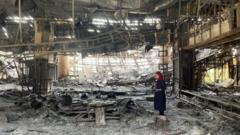The decision to remove HTS from the terrorist organization list is expected to redefine US-Syria relations amid the country's political transition.
US to Delist Syria's HTS from Terrorism Classification

US to Delist Syria's HTS from Terrorism Classification
The US announces significant policy change regarding Syria's Islamist group Hayat Tahrir al-Sham (HTS).
The United States is preparing to remove the Syrian Islamist group Hayat Tahrir al-Sham (HTS) from its list of foreign terrorist organizations as early as Tuesday, according to a memo from the State Department. This group, which initiated a rebel offensive that ultimately brought down the long-standing Assad regime in December, has since seen its leader, Ahmed al-Sharaa, assume the role of interim president of Syria.
Formerly known as al-Nusra Front, HTS was once affiliated with al-Qaeda until al-Sharaa severed those ties in 2016. The loosening of US sanctions against Syria signals a potential shift in the West's approach to the region, particularly following an executive order signed by Trump in June intended to facilitate a "path to stability and peace."
The US government emphasized that it would continue to closely monitor the actions of the new Syrian administration, with specific attention to initiatives geared toward normalizing relations with Israel, addressing foreign terrorist elements, and counteracting Palestinian terrorist organizations.
Syrian Foreign Minister Asaad al-Shibani welcomed the impending removal of HTS from the terror list, claiming it would "remove barriers" to economic revitalization and better integrate Syria back into the international community. Signs of potential diplomatic thawing emerged when Syria expressed readiness to engage with the US to revisit a 1974 disengagement agreement concerning Israel.
In a landmark visit, UK Foreign Secretary David Lammy traveled to Syria over the weekend, marking the first visit by a British government official in 14 years. After meeting al-Sharaa, Lammy announced a £94.5 million support package aimed at fostering long-term recovery and assisting nations that aid Syrian refugees. Earlier, the UK had eased sanctions on Syria’s defense and interior ministries.
Despite these consolidating political changes, concerns linger regarding al-Sharaa’s leadership capabilities. With 90 percent of Syria's population now living below the poverty line following 13 years of brutal civil conflict, al-Sharaa’s promise of a new governance style has raised doubts. Up to this point, only a single female minister has been appointed, while al-Sharaa has directly made nearly all other political appointments. The country has witnessed a troubling surge in violence against minority groups, highlighted by deadly incidents involving the Alawite sect and a suicide attack on a Damascus church, which left at least 25 casualties.




















